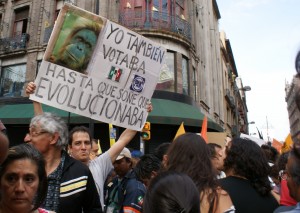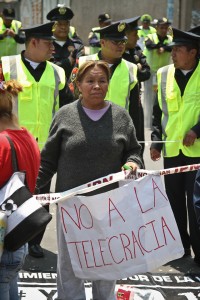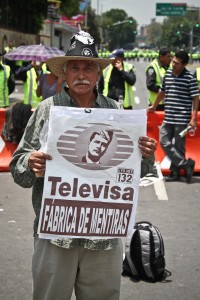“We are the children of the ideals you couldn’t kill.”
A young woman carried the hand-lettered sign as she marched with tens of thousands of people in Mexico City last July 22. Twenty-something, with long black hair and jeans, her message captures the spirit and sense of history of Mexico’s new movement for real democracy. At the same time, it reveals the resentment that especially youth feel about the presidential elections and a new government that for them representsan era of manipulation and repression.
Weeks after Mexico’s presidential elections, thousands of people have turned out to protest the declared winner, Enrique Peña Nieto, and the imminent return to power of the party that ruled Mexico for more than seven decades. The Institutional Revolutionary Party, or PRI, which is slated to take office December 1, now faces increasing accusations of fraud, a legal demand to declare the elections invalid, and a youth movement that refuses to go away.
#IAm132
“Mexico, Without the PRI”, “Electoral Institute, You Coward—Correct the Elections!” and “Mexico Voted and Peña Didn’t Win!”–men and women chanted these slogans through downtown avenues in the latest demonstration, vowing that the politician best known for his hair-do and ties to old-style Mexican politics would never take office. Most of the marchers are university-age, but contingents of workers, neighborhood associations, and citizens of all ages take part.
Many support the opposition candidate and second-place finisher, Andres Manuel Lopez Obrador. But the media spin that the entire movement is a contrivance of a poor loser falls flat when confronted with the actual messages and motives of the movement.
Mexico is seeing the birth of a movement for real democracy. It is led by a generation that wants to break through the cynicism of a nation accustomed to corruption and authoritarian rule. Its members challenge not just the election results, but the very definition of democracy.
The movement called “#IAm132” that arose in protest to Peña Nieto at a local university centers on the principle that democracy can’t be bought. Young people with no adult memory of living under the PRI have looked at their nation’s history and decided they don’t want to go back there.
The “#IAm132” movement–with the hashtag in its name marking its generational identity–has a broad platform that includes: democratization of the media to guarantee the right to information and freedom of expression; “secular, free, scientific, pluricultural, democratic, humanist, popular, critical, quality education”; change in the neoliberal economic model with less emphasis on the market and more state involvement; transformation of the security and justice model and withdrawal of the army from public security; participative democracy and autonomy; and health as a human right.
PRI’s Rocky Road Back to Power
Few people predicted Mexico’s post-electoral protests or the rapid rise of the youth-led movement against Peña Nieto. The PRI learned from its loss to Vicente Fox in 2000 and the convulsive post-electoral protests of 2006, when conservative candidate Felipe Calderon was declared the winner with the slimmest of margins and widespread accusations of fraud. It set out to avoid both scenarios, grooming its candidate years earlier to position him as the image of the “new PRI.”
 The effort reportedly included secret deals with the major television stations for favorable coverage in the media dating back to 2009. Both the Mexican magazine Proceso and later The Guardian reported on these contracts, although the PRI denied the charges.
The effort reportedly included secret deals with the major television stations for favorable coverage in the media dating back to 2009. Both the Mexican magazine Proceso and later The Guardian reported on these contracts, although the PRI denied the charges.
It also included rebuilding the political machine that served the party during its 71 years of uninterrupted rule over the country. That political machine suffered a debilitating blow with the election of Vicente Fox of the conservative National Action Party (PAN) in 2000. The PRI not only lost the helm of a nation it had confidently controlled for years, it also lost its majority in the legislature and several state governorships to boot. It was a dramatic and ignominious fall from power, and the age of “the dinosaurs”—as the PRI political elite is called—appeared to be over for good.
But at least one insider and numerous analysts claim that the PAN agreed to leave the PRI political machine in place in return for support for its reform proposals in the legislature and the continued dominance of a small and powerful economic elite. The PRI was able to rebuild without fear of criminal charges for past acts of corruption and repression among its ranks.
The 2012 elections proved that the machine has been well oiled and employs many of the same tactics used to guarantee electoral wins in the past. But the goal of building a solid margin of victory to assure legitimacy backfired due to citizen and some media monitoring of blatant abuses
A coalition of progressive parties filed a legal challenge on July 12 to declare the presidential election invalid due to violations of articles of the Mexican constitution that call for free and fair voting. The demand specifically cites exceeding campaign spending limits as the cause. The legal limit is set at the unlikely figure of $336,112,084.16 pesos—about $25.4 million dollars. The coalition says it has proof that the PRI-Green Party spent five times the allowed limit.
In the most potentially damaging aspect of the allegations, Lopez Obrador accused the PRI of laundering money through off-the-books campaign spending. The opposition has demanded an investigation into the possible use of public funds in PRI-governed areas and money from illicit sources, including organized crime. The use of pre-paid bankcards is a common form of money laundering. The PRI issued thousands of these cards from a bank called MONEX to voters in a presumed vote-buying operation. (One protest sign noted acidly, “Mexico’s elections were so clean, even the money was laundered”).
The legal challenge also cites evidence of buying off pollsters to create an impression that the election was in the bag. Many polling companies confidently reported double-digit leads for Peña Nieto,with up to an 18-point lead. The final count showed just over 6 points, with Peña Nieto at 38.21 percent, Lopez Obrador at 31.59 percent, and conservative candidate Josefina Vazquez Mota at 25.41 percent. Whether the discrepancy resulted from faulty methodology or giving the client what he wants has become the subject of daily conversation in Mexico.
US-Mexico Drug War Alliance
President Obama called Peña Nieto to congratulate him on his victory even before Mexican electoral authorities had declared the victory. The White house issued a readout of Obama’s call to Peña Nieto, heralding a continued partnership in “democracy, economic prosperity and security.”
The Obama administration’s rush to affirm support for the embattled candidate is not a sign of enthusiasm for the return of the PRI. The U.S. government clearly would have preferred another conservative government in Mexico. The National Action Party swung the door wide open to greater U.S. involvement in the country. Agencies including the DEA, ATF, CIA, and FBI as well as“retired” military personnel now participate in and operate Mexico’s disastrous internal security policies. Felipe Calderon’s war on drugs proved the perfect vehicle for breaking down resistance to U.S. intervention and making huge inroads in its regional security plan, which includes integrating Mexico into its “regional security perimeter.”
But the Obama administration was eager to put the elections behindto get center-left candidate Andres Manuel Lopez Obrador off the political stage as soon as possible. Lopez Obrador openly called for ending the drug warand “adopting a different strategy” during his final campaign speech.
Ignoring the post-electoral conflicts already brewing south of the border, the White House congratulated the candidate and the Mexican people for having “demonstrated their commitment to democratic values through a free, fair, and transparent election process.”But well before Lopez Obrador filed the legal challenge, evidence of vote buying had surfaced and the “Iam132” movement and others were expressing accusations of fraud.
When asked by a reporter on July 9 if the State Department still maintained that the elections were “transparent,” spokesperson Patrick Ventrell dodged the question, stating only that “we welcome the electoral authority’s announcement of the final results, and obviously we look forward to working with President-elect Mr. Pena Nieto.”
The administration accepted Peña Nieto when polls showed a significant lead and hurriedly arranged meetings with its soon-to-be new ally well before the elections. The Pentagon-driven Mexico policy requires a willing partner in the drug war. Mexican army troops are now stationed in strategic locations throughout the country, ostensibly to stop the flow of illegal drugs and capture drug kingpins. They have repeatedly acted to repress human rights defenders and subdue communities protesting the loss of natural resource control or army presence. The armed forces act as a form of social control, while army officials have been accused of being in cahoots with organized crime in several cases.
Continuing the drug war is at the top of the U.S. binational agenda. Congress has sustained it through consistent funding of the Merida Initiative since the Bush plan passed in 2008. The Senate Foreign Relations Committee just recommended four more years and a billion more U.S. taxpayer dollars, despite the fact that the joint strategy has resulted in 60,000 fatalities in Mexico and no measurable decrease in the flow of illicit drugs to the U.S.
Peña Nieto repaid the favor the same day he received the premature congratulations from Obama. In a press conference he endorsed the strategy of using the army to attack the cartels head-on. He also announced his commitment to bringing about the major structural reforms that the U.S. government and national and transnational economic interests have been demanding for years. These include the privatization of the national oil company PEMEX along with fiscal reforms and labor reforms that would weaken unions and labor rights. He also called for the creation of a special police force made up of military personnel to overcome legal obstacles to the deployment of the armed forces for public safety. U.S. business organizations like the Americas Society have heaped praise on the “new PRI.”
Pena Nieto stated, “Without a doubt, I am committed to having an intense, close relationship of effective collaboration measured by results,” alleviating fears that the former nationalist party would distance itself from the new military/police alliance with its powerful neighbor. He has announced the appointment of a former chief of Colombia National Police, General Oscar Naranjo, as his top security adviser before the elections. Naranjo is a key player in Colombian security policy and very close to the U.S. security establishment.
There are four months until the inauguration. Mexico’s long lame-duck period will be rife with protests. The IAm132 movement joined with other grassroots organizations in mid-July to lay out a series of mobilizations tied to the date the electoral authorities must ratify electoral results (September 6), inauguration (December 1), and beyond.
In questioning the role of media monopolies, publicity and public image, vote buying, campaign spending, and political operators, Mexico’s new movement is raising serious questions about electoral democracy. The questions don’t only apply to Mexico–a nation emerging from and perhaps returning to authoritarian government. They also have much relevance to the United States as it heads toward presidential elections in November. 
Laura Carlsen is Director of the CIP Americas Program in Mexico City www.americas.org.
Photos: Clayton Conn, Alfredo Acedo




